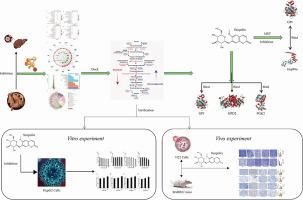Journal of Ethnopharmacology ( IF 4.8 ) Pub Date : 2022-06-16 , DOI: 10.1016/j.jep.2022.115469 Chen Wang 1 , Qin Zhou 2 , Song-Tao Wu 2

|
Ethnopharmacological relevance
Smilax china L. is a well-known traditional medicinal plant. In China, it is a common anti-cancer drug that has been inherited for thousands of years. Some in vitro and in vivo studies have confirmed its potential lipid-lowering, anti-inflammatory and anti-ovarian cancer effects. However, there is no research on the material basis and mechanism of the rhizome of Smilax china L. against hepatocellular carcinoma.
Aim of the study
To explore the material basis and mechanism of scopolin from Smilax china L. against hepatocellular carcinoma.
Methods
The potential targets and active components of Smilax china L. against hepatocellular carcinoma were screened by transcriptomics, network pharmacology and molecular docking. Microscale Thermophoresis (MST) detection was used to verify the affinity of small molecule compounds with potential proteins and protein-protein interaction. The Extract from HepG2 cells was used to measure the expression of glycolysis-related proteins, glucose consumption and lactate production. The expression of apoptosis-related factors and glycolysis-related proteins in vivo was detected by immunohistochemistry.
Results
The glycolysis-related proteins glucose-6-phosphate isomerase (GPI), glycerol-3-phosphate dehydrogenase, mitochondrial (GPD2) and phosphoglycerate kinase 2 (PGK2) screened by transcriptomics, network pharmacology showed strongly binding with scopolin by molecular docking. MST detection has also verified the affinity of scopolin with GPI and GPD2. It was the first time found that Heat shock protein HSP 90-alpha (Hsp90α) bound strongly to GPI and GPD2 in the worldwide, while scopolin was able to affect the interaction between Hsp90α and GPD2. In vitro and in vivo experiments further demonstrated that scopolin may play an anti-cancer role by affecting the stability of tumor-associated proteins. The results showed that scopolin obtained from Smilax china L. could regulate the expression of GPI, GPD2 and PGK2 and inhibit the interaction of protein-protein, reduce the energy metabolism of tumor tissue, thereby inhibit tumor growth.
Conclusion
Scopolin obtained from Smilax china L. plays the role of anti-hepatocellular carcinoma by regulating the expression of glycolysis proteins GPI, GPD2 and PGK2. Scopolin could affect the interaction between Hsp90α and GPD2 may provide a novel potential treatment direction for hepatocellular carcinoma.































 京公网安备 11010802027423号
京公网安备 11010802027423号